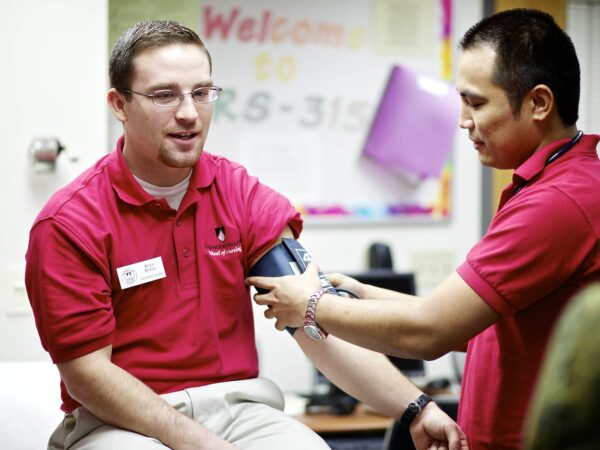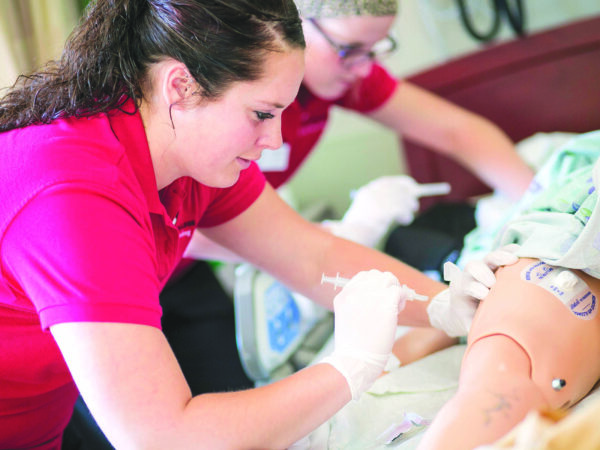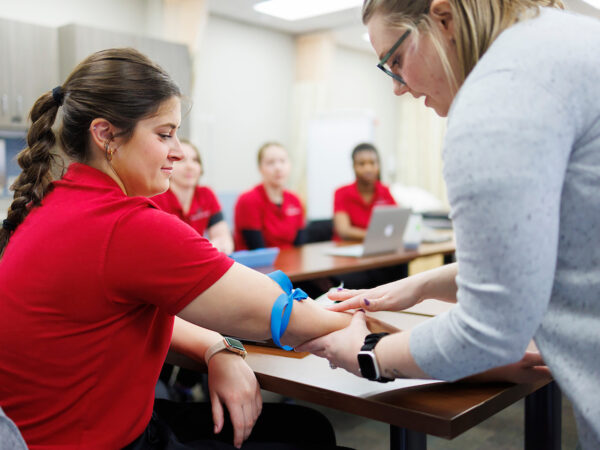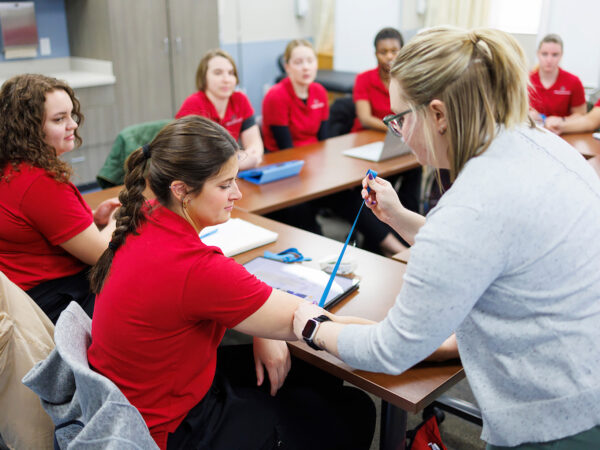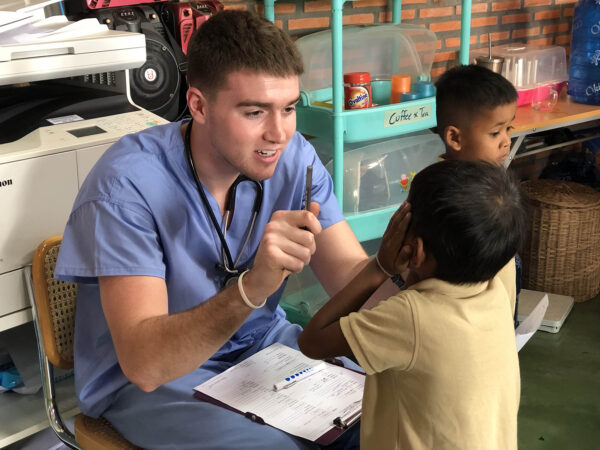Master of Science in Nursing: Psychiatric Mental Health Nurse PractitionerHenry Predolin School of Nursing, Business, Education, and Health Sciences
Why Earn Your MSN as a Psychiatric Mental Health Nurse Practictioner
The MS in Nursing: Psychiatric Mental Health Nurse Practitioner (PMHNP) program is designed for nursing professionals seeking to expand their scope of practice to providing psychiatric, mental, and emotional health care to patients across the lifespan. Through didactic courses in advanced pathophysiology, advanced physical assessment, advanced pharmacology/psychopharmacology, psychotherapy, diagnostics, and mental health management, as well as advanced practice clinical experiences, this program imparts the expertise needed to manage the psychiatric and mental health care needs of diverse populations in a variety of care settings. Graduates will be eligible to sit for the Psychiatric Mental Health Nurse Practitioner certification exam.
We offer two tracks to reach your educational and professional goals of becoming a Psychiatric Mental Health Nurse Practitioner (PMHNP). You can choose to complete the Master of Science in Nursing (MSN)-PMHNP as a standalone pathway or continue on to the Doctor of Nursing Practice (DNP)-Executive Leadership degree.
The advantage to Edgewood College’s program structure is that after receiving the MSN-PMHNP, you can seek certification and work in that capacity while continuing on with your doctoral-level coursework to also complete the DNP.
Global
Virtual
51
Join us for our MSN Information Session
Learn more about the MSN program at Edgewood College. We’ll discuss program, courses, application, and your questions. Register for an online session below:
- Wednesday, March 26, 2025 at 12:00 PM until 1:00 PM
- Wednesday, April 2, 2025 at 5:00 PM until 6:00 PM
- Monday, April 7, 2025 at 12:00 PM until 1:00 PM
- Friday, May 2, 2025 at 12:00 PM until 1:00 PM
All sessions are in Central Daylight Time
Career Outlook for Master’s in Psychiatric Nursing Graduates
According to the National Institute of Mental Health, one in five adults in the United States live with some form of mental illness.
No matter the level of severity, living with mental illness can take a toll on one’s personal and professional life — making the need for skilled mental health professionals a top priority for medical facilities across the country.
The U.S. Bureau of Labor Statistics reports that the employment of mental health counselors is projected to grow by 22% from 2021 to 2031 and that the employment of all nurse practitioners is set to grow by 40% in a similar timeframe. As a licensed nurse practitioner, you can expect to make around $123,780, according to the same Bureau of Labor Statistics report.
After graduating from Edgewood College’s online psychiatric NP program, you will be equipped to work in a variety of healthcare environments, including:
- Doctor’s offices
- Schools and universities
- Healthcare clinics
- Hospitals
Featured Courses
NRS 691 – Neuropathophysiology
This course is designed to provide advanced practice nursing students with knowledge of the essential neuropathophysiology of mental illness across the lifespan. Building on the basics of cell physiology and neural transmission, this course focuses on the neurobiology of select serious mental illnesses. There is an emphasis on the neural structures and functions thought to be implicated in symptom presentation and disease progression of select serious mental illnesses.
NRS 696A – Equity/Management Diverse Populations
This course is designed for advanced practice nursing students to develop and enhance skills engaging with and understanding of diverse populations. We will be exploring issues of health disparity and bias, and expanding on skills in interviewing patients across cultures. We will also be addressing unique aspects of care when working with special populations such as BiPOC, LGBTQ+, children, geriatrics, pregnant women, veterans, medically-complex individuals, and patients with trauma history.
NRS 696B – Transition to PMH Nursing Practice
This course is designed for PMHNP students to support their transition confidently to practice as independent advanced practice registered nurses. Students will focus on leadership, quality improvement, safety, health policy, and regulatory bodies important to practice. We will also review in greater depth clinical topics pertaining to role of the PMHNP (collaboration, consultation, therapeutic relationships) as well as preparation for PMHNP board certification.
Course Information and Schedule
The majority of coursework for all MS in Nursing programs will be delivered in an online format (Practicum and Advanced Practice Clinical Courses require face-to-face meetings and in-practice hours). Most courses are offered over 8-week sessions. Students should speak to their advisor if they have further questions regarding the format of course facilitation.
Students may be able to complete the comprehensive program in two years by taking two courses each semester; Students may be able to complete the CNS or NP programs in three years by taking two courses each semester.
Students can enter the programs at the beginning of any session. Although students do meet with an advisor to plan out their course sequences, these plans may change during the student’s time in the program. The time to complete this degree depends on the number of courses taken per semester and communicating with the advisor regarding any changes in the course plan.
MSN-Psychiatric Mental Health Nurse Practitioner
- 51 Total Credits
- Completed in 3 years (full time)
- Full or part-time options
- Fully online
MSN-Psychiatric Mental Health Nurse Practitioner and DNP-Executive Leadership
- 75 Total Credits
- Completed in 5 years (full time)
- Full or part-time options
- Fully online
Related Programs
PMHNP Online Program FAQ
Why should I consider working in mental healthcare as a nurse?
Mental health nurses play an important role in providing both physical and mental care to individuals with psychiatric illnesses. Practicing mental healthcare as a nurse can be an extremely rewarding career that gives you the opportunity to:
- Support those with a variety of mental health issues
- Contribute to tailored treatment plans for patients
- Provide specialized assistance to those experiencing conditions such as depression, anxiety, schizophrenia, bipolar disorder, substance use disorder, and eating disorders
Working in mental healthcare as a nurse allows you to bring your clinical background to the forefront of the battle against mental health disorders. Working with patients to live with or overcome their mental health disorders is rewarding work that truly makes a difference in your community.
What are the steps for becoming a certified PMHNP?
Generally, the requirements for becoming a certified psychiatric health nurse practitioner include completing an accredited nursing program and obtaining a registered nursing license in the appropriate jurisdiction.
Additionally, you must then complete a master’s in psychiatric nursing or mental health certification for nurses.
What is the difference between a PMHNP and a psychiatrist?
While both psychiatric health nurse practitioners and psychiatrists diagnose and treat mental health issues, their backgrounds are very different.
Psychiatrists have a medical degree, with additional years of specialized training in the diagnosis and treatment of mental health conditions.
Psychiatric health nurse practitioners also have an advanced degree, usually a Master’s in Psychiatric Nursing. In addition to their advanced degree, they’ve undertaken specialized training to master the art of psychiatric nursing.
Though both roles are important when it comes to giving proper care to mental health patients, there is an important distinction between the two.
What does a typical day as a psychiatric nurse practitioner look like?
After you earn your certification in psychiatric nursing and land your desired role, you can expect your typical day to include:
- Meeting patients and assessing their mental health needs
- Developing and/or managing a patient’s treatment plan
- Having conversations with the patient to facilitate discussions about their mental health and ensure compliance with interventions
- Maintaining clear, accurate records of patient care while adhering to confidentiality protocols
What are the admission requirements for this program?
Applicants seeking admission to School of Nursing MS in Nursing programs and the PMHNP program must fulfill the graduate program admission requirements, with the following additional stipulations:
- Provide evidence of a baccalaureate or more advanced degree from a nursing program accredited by a national nursing accreditation body with a cumulative grade point average of at least 3.0 on a 4.0 scale for regular admission status. (The cumulative grade point average is computed on the highest degree held at the time of application to the Edgewood College graduate program.)
- Complete and submit online graduate application.
- Request official transcripts for all undergraduate and graduate academic credits received be sent to Edgewood College.
- Provide two letters of recommendation from nursing supervisors and/or colleagues who can focus on your qualifications for success in graduate school.
- Submit a written statement of no more than 500 words, addressing your ambition to be admitted specifically into the PMHNP Program based upon these questions:
- What makes you believe that you will be a good fit to become a psychiatric nurse practitioner (personality, education, experiences, etc.)?
- In the next five years following the completion of your PMHNP program, what are your goals and dreams in your role as a provider, advocate, and leader in the mental health community?
- A current CV/resume
- Hold a current license as a registered professional nurse.
What is the admission process like for this program?
Program Directors of the PMHNP program will review all qualified applications and arrange applicant interviews. Program Directors are responsible for making the final decision of students eligible for admission. Students will be notified in writing of their acceptance to the PMHNP program by the SoN Dean. Admission to the PMHNP program is competitive; even students who meet the minimum requirements may not be admitted. Because of enrollment limits in the PMHNP, the School of Nursing may deny admission to qualified students.
What are the goals of this program?
The MS in Nursing program will prepare advanced role (Administration and Education) and advanced practice (CNS and NP) nurses who will:
- Integrate scientific findings from nursing, biopsychosocial fields, genetics, public health, quality improvement and organizational sciences for the continual improvement of nursing care across diverse settings.
- Evidence leadership skills needed that emphasize ethical and critical decision making, effective working relationships, and a systems perspective.
- Articulate methods, tools, performance measures, and standards related to quality, as well as apply quality principles within an organization.
- Apply research outcomes within the practice setting, resolve practice problems, works as change agents, and disseminate results.
- Use patient-care technologies to deliver and enhance care and use communication technologies to integrate and coordinate care.
- Intervene at the system level through the policy development process and employ advocacy strategies to influence health, health care, and health policy.
- Act as a member and leader of inter-professional teams, communicate, collaborate, and consult with other health professionals to manage and coordinate care for individuals and populations.
- Apply and integrate broad, organizational, client-centered, and culturally-appropriate concepts in the planning, delivery, management, and evaluation of evidence-based clinical prevention and population care and services to individuals, families, and aggregates/identified populations.
- Develop strategies to achieve quality outcomes in care delivery with respect to fiscal and human resources.
- Apply management, leadership, and systems theory to the design and implementation of services in a health care system.
- Practice independently and collaboratively with an interprofessional team while delivering direct and indirect care services in various types of health care systems to promote health, prevent disease and improve the health status of diverse individuals, families, communities, and populations.
- Value life-long learning and continuing professional development.
Does this program require a background check?
The SoN and all clinical agencies under contract to the School require that every student and faculty member have a background check completed by the Criminal Justice Department of Wisconsin. Students must complete Background Information Disclosure forms before entry into the Nursing Practicum or Advanced Practice Clinical courses. Background checks are completed at the student’s expense.
Are there any health requirements for this program?
Before entering the Nursing Practicum or Advanced Practice Clinical courses, students must provide evidence of meeting the health requirements for the agency in which they complete the Practicum or Advanced Practice Clinical.
